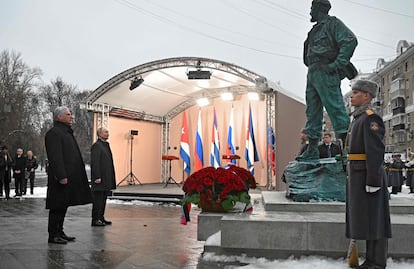Cuba’s president praises Putin, blames US for invasion of Ukraine
In a visit to Moscow, Miguel Díaz-Canel showed his support for Russia’s leader, in exchange for the postponement of debt payments


Cuba and Russia are united by sanctions and historic confrontations with the United States. On Tuesday, the leaders of the two countries – Miguel Díaz-Canel and Vladimir Putin – met in Moscow to strengthen their bond.
While Cuba’s delegation to the United Nations General Assembly has abstained on resolutions to condemn the Russian invasion of Ukraine, Díaz-Canel – the president of Cuba and the first secretary of the Communist Party of Cuba – has been far less tepid in his support of the Kremlin. On Tuesday, he praised the illegal annexation of several Ukrainian provinces by Russia, while accusing the United States of having provoked the war by expanding NATO membership.
Beyond solidarity, there is a clear economic incentive behind this embrace of Putin. Just before the invasion of Ukraine began, the Kremlin postponed Cuban debt payments until 2027. Russia has loaned Cuba – a country long-plagued by economic crisis – $2.3 billion since 2006.
“We denounce the sanctions against Russia and the sources of the current conflict… make no mistake, Russia is not responsible,” the Cuban president said at the beginning of his meeting with Putin. He went on to accuse Washington of expanding NATO “in an unacceptable manner” towards the Russian border, while praising “the vigorous historical analysis” that Putin has used to justify his armed offensive and the annexation of sovereign Ukrainian territory. Kremlin policy has generally recognized Ukraine as being part of the greater Russian territory, even after the fall of the Soviet Union.
“The world has to wake up: who sets the rules? Who creates the rules that they themselves violated?” Díaz-Canel asked rhetorically at the ceremony in Moscow, which saw the unveiling of a monument honoring the late-Cuban dictator, Fidel Castro.
“For us, this visit has deep significance. We’re doing it at a time when both nations [Cuba and Russia] are subject to unjust sanctions that come from the same enemy: the Yankee empire that has manipulated an important part of the world,” railed the Cuban president, before underlining his “commitment to the Russian Federation.”
Before holding their meeting, Díaz-Canel and Putin inaugurated a monument to Fidel Castro in the Moscow neighborhood of Sókol. It wasn’t a long ceremony: the homage to the man who ruled Cuba with an iron fist for nearly half-a-century was cut short, as freezing rain covered the Russian capital with ice.
“Together, we will further strengthen our alliance and defend the great values of freedom, equality and justice,” Putin said during the ceremony, as a group of Russian soldiers in formal dress laid bouquets of flowers next to the statue.
While the Caribbean island is a close ally of Russia, it’s in a difficult geopolitical situation. Before the invasion, the Cuban government maintained good relations with Ukraine. The “anti-imperialist” rhetoric of the Communist Party of Cuba is incoherent with the unprovoked annexation of Ukrainian land.
Havana’s erratic position has been on full display in the UN General Assembly. On March 2, Cuba abstained from voting on the resolution that demanded that Moscow immediately cease hostilities. The delegation also remained on the sidelines in October, when the UN condemned the Russian annexation of Ukrainian territories. Cuba’s UN ambassador, while accusing the West of “supreme hypocrisy,” has avoided addressing the violence against Ukrainians: “It is our responsibility to reduce tensions, not raise them.”
On other votes, Cuba’s UN delegation has been more unequivocally pro-Russia. In April, they voted against suspending Russia from the Human Rights Council. And, in mid-November, the delegation rejected another resolution, which urged Moscow to pay war reparations to Kyiv.
The deferment of debt repayments to Russia that Díaz-Canel managed to secure just before the invasion began has been essential. The state-led Cuban economy is in ruins; more than 200,000 Cubans have fled the island in 2022, desperate to make a living elsewhere.
Cuba defaulted on its Russia debt in 2020 and asked for more time. Now, under tougher sanctions, the Kremlin needs revenue more than ever, but Cuba still can’t pay up.
“I would like to say that Cuba is ready to fulfill its financial obligations… as soon as the economic situation eases a bit,” Díaz-Canel said this Tuesday, when he addressed members of the State Duma, the Russian parliament. With the political support that he is offering Putin, it appears that he will safely be able to continue postponing repayment.
The Cuban president’s international tour will continue with a state trip to China from November 24 to 26, during which he will meet with Chinese leader Xi Jinping, another major creditor of the Cuban government.
Tu suscripción se está usando en otro dispositivo
¿Quieres añadir otro usuario a tu suscripción?
Si continúas leyendo en este dispositivo, no se podrá leer en el otro.
FlechaTu suscripción se está usando en otro dispositivo y solo puedes acceder a EL PAÍS desde un dispositivo a la vez.
Si quieres compartir tu cuenta, cambia tu suscripción a la modalidad Premium, así podrás añadir otro usuario. Cada uno accederá con su propia cuenta de email, lo que os permitirá personalizar vuestra experiencia en EL PAÍS.
¿Tienes una suscripción de empresa? Accede aquí para contratar más cuentas.
En el caso de no saber quién está usando tu cuenta, te recomendamos cambiar tu contraseña aquí.
Si decides continuar compartiendo tu cuenta, este mensaje se mostrará en tu dispositivo y en el de la otra persona que está usando tu cuenta de forma indefinida, afectando a tu experiencia de lectura. Puedes consultar aquí los términos y condiciones de la suscripción digital.








































